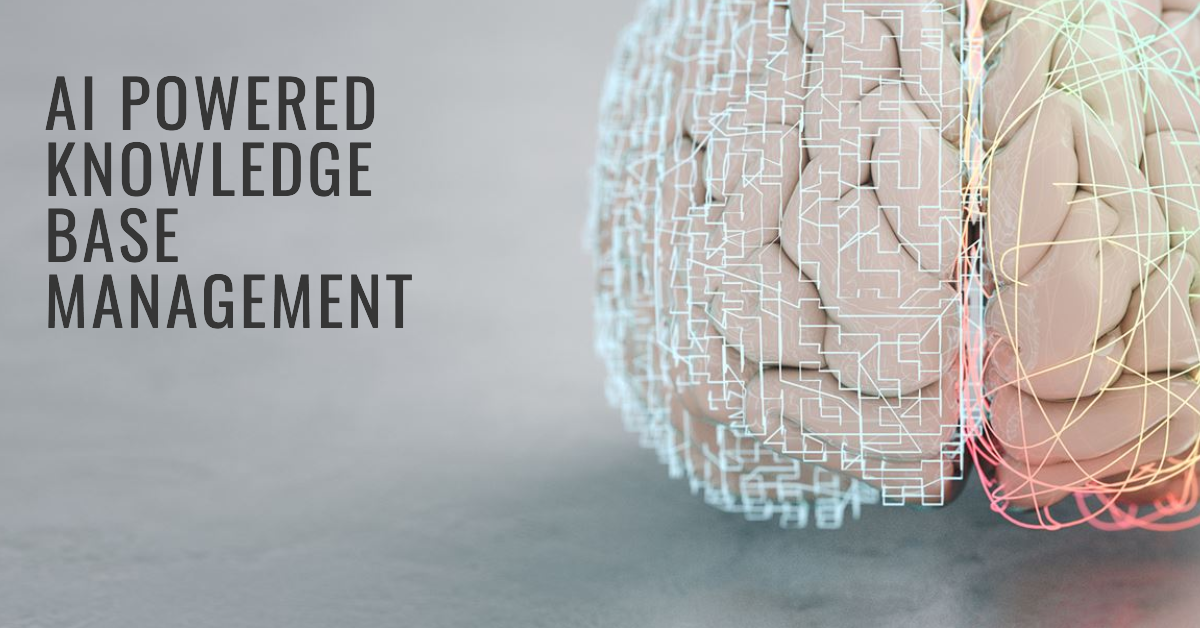In the era of digital transformation, organizations are increasingly focusing on managing their knowledge resources efficiently. Artificial intelligence (AI) has emerged as a powerful tool to revolutionize the way businesses handle their knowledge bases. In this article, we will explore what an AI-powered knowledge base is and how it can help organizations effectively manage their information assets.
The Importance of Knowledge Management in Organizations
Knowledge management (KM) refers to the process of capturing, organizing, and utilizing an organization's collective expertise and information resources effectively. With rapid advancements in technology and increasing volumes of data generated daily, KM has become crucial for organizations to stay ahead in today's competitive world. An efficient KM system enables better decision-making, improved customer service, increased innovation capacity, and reduced operational costs.
How AI is Revolutionizing Knowledge Management
Artificial Intelligence plays a significant role in transforming traditional KM systems into more effective tools capable of adapting to ever-changing business environments. By automating repetitive tasks such as data analysis or content curation using intelligent algorithms like natural language processing (NLP), machine learning (ML), or deep learning techniques - AI provides unique advantages that make your KM efforts more efficient than ever before.
What is an AI-Powered Knowledge Base?
Definition of a Knowledge Base
A knowledge base is a centralized repository where organizations store all essential documents such as policies procedures manuals best practices FAQs user guides case studies whitepapers videos etc., making them easily accessible employees customers partners alike when needed It serves primary source vital insights empowering workforce deliver exemplary performance across various functions domains.
To better understand how AI Knowledge Base Management works, it's important to know what artificial intelligence is. Once you have this foundation, you will appreciate more how AI Knowledge Base Management can revolutionize your business.
Role of Artificial Intelligence in Enhancing Knowledge Bases
Improving Searchability and Accessibility of Information
AI-powered search engines leverage NLP algorithms understand users queries contextually rather than relying keyword matches alone resulting faster accurate retrieval relevant results Additionally these sophisticated enable semantic which allows linking related concepts together provide comprehensive responses even complex questions.
Algorithms for Better Organization and Categorization
AI tools can automatically classify categorize content knowledge bases using advanced techniques such intent recognition pattern detection cluster analysis This helps maintaining well-structured easily navigable repository reducing time efforts spent locating required information.
Benefits of AI-Powered Knowledge Bases
Efficiency and Time-Saving in Information Retrieval
By automating search processes making them more precise, AI-powered KM systems significantly reduce the time needed to find pertinent details, enabling employees to focus on value-added tasks instead.
Improved Decision-Making through Better Insights
With access accurate up-to-date information fingertips decision-makers equipped make informed strategic choices driving growth success organizations effectively minimizing risks associated uncertainty.
Enhanced Customer Service and Support
Integrating AI capabilities chatbots customer support platforms drastically improves response times quality assistance provided clients By quickly retrieving relevant data from knowledge base answering common inquiries autonomously agents spend resources addressing complex issues building stronger relationships customers thereby improving satisfaction loyalty
Reduction in Operational Costs
Implementing an efficient AI-driven KM system reduces manual labor requirements streamlines workflows leading lower overhead expenses long run Furthermore these intelligent tools help identify gaps redundancies within organization's existing resources optimize overall performance cost-effectively.
Key Components of AI-Powered Knowledge Management Systems
Here is a table comparing traditional knowledge management and AI-powered knowledge management:
Aspect | Traditional Knowledge Management | AI-Powered Knowledge Management |
Searchability and Accessibility | Keyword-based search; limited context understanding | NLP algorithms for contextual queries, semantic search |
Information Organization | Manual categorization and organization | ML algorithms for automatic classification, pattern detection |
intelligence | Rely on human intelligence to analyze the dense data generate insights | Artificial Intelligence use machine learning models |
Natural Language Processing (NLP)
Automating Text Analysis and Understanding User Queries
NLP algorithms enable machines read analyze large volumes unstructured text comprehend human language effectively These technologies also assist processing understanding queries posed users formulating appropriate responses contextually significantly improving user experience navigating knowledge base
Semantic Search Capabilities
Through semantic search, NLP-powered engines go beyond simple keyword matching recognize synonyms related terms concepts produce richer results catered specific needs individuals accessing information resource.
Machine Learning Algorithms for Content Organization and Recommendations
Intent Recognition, Pattern Detection, Cluster Analysis
ML techniques help identify patterns trends within vast data sets extract useful insights These algorithms also detect users' intent behind queries classify content accordingly ensuring relevant organized manner streamlined access
Content Curation Based on User Behavior
By analyzing user behavior preferences AI-driven systems can recommend personalized tailored individuals enhancing their experience promoting efficient knowledge sharing across organization.
AI-based Authoring Tools to Assist Knowledge Base Creation
These tools facilitate rapid seamless creation high-quality articles other materials populate repository They language generation summarization capabilities automate drafting editing processes while maintaining natural human-like tone style.
How to Implement AI in Knowledge Management
Choosing the Right Platform or Software Solution
Cloud-based vs In-house Solutions
Organizations must weigh pros cons each option before deciding invest cloud-hosted locally installed KM software Factors consider include scalability security data privacy compliance ease integration existing systems budget constraints among others Ingestai.io offers a versatile solution that caters diverse requirements helping users build AI solutions efficiently without reinventing wheel every time.
Integrating with Existing Sources of Information
Bridging the Gap Between Knowledge Repositories
Seamlessly integrating various sources like internal wikis, external databases, and social media channels ensures comprehensive coverage all pertinent organizational data within centralized resource facilitating better collaboration communication among team members.
Organizing and Categorizing the Knowledge Base Content
Setting Metadata Standards and Taxonomy
Establish consistent metadata tagging taxonomy structures ensure uniformity across entire system making it easily navigable manageable both administrators end-users alike Additionally setting proper permissions access control levels maintain integrity confidentiality sensitive information stored within base preventing unauthorized misuse manipulation resources
Training the AI System
Providing Data for Learning Algorithms
Train ML models using historical existing large enough dataset curated specifically targeted tasks helps achieve desired accuracy outcomes minimizing errors false positives negatives during actual implementation
Ensuring Accurate Results Through Ongoing Feedback
Continuous monitoring tuning learning algorithms based feedback received real-world scenarios maintains optimal performance adapts evolving business landscape technological advancements over time
Use Cases of AI-Powered Knowledge Bases in Various Industries
Healthcare - Enhancing Diagnosis & Treatment Recommendations
AI-driven knowledge bases can assist medical professionals access up-to-date research findings treatment guidelines effectively leading better patient outcomes informed decisions regarding care.
Customer Service - Managing FAQs, Improving Customer Interactions (Chatbots)
Integrating AI-powered chatbots KM systems greatly enhances customer service experience providing instant accurate responses common questions Ingestai's empowering Brett Malinowski team community serves excellent example implementation.
R&D Departments - Streamlining Research Processes, Knowledge Sharing
By managing organizing vast amounts research data publications efficiently sharing insights researchers scientists departments benefit significantly through improved collaboration innovation capacity
Human Resources - Talent Management, Recruitment Analytics
AI-based KM tools facilitate efficient talent acquisition management identifying skill gaps analyzing candidate profiles streamlining recruitment process overall
Potential Challenges & Risks in Implementing an AI-Powered Knowledge Base
Data Privacy Concerns Regarding Proprietary Company Information
Ensuring security compliance regulations safeguarding sensitive organizational information paramount when implementing any new technology solution including AI-driven knowledge bases Adequate measures must adopted mitigate potential risks associated breaches leaks confidential data.
Resistance to Change and Adoption of AI Technologies
Employees and stakeholders may be reluctant to adopt any new technology that drastically changes their workflow or evokes fear of job displacement. Ensuring transparency, clear communication, and providing access to necessary training modules can help ease the transition and increase the likelihood of successful adoption.
Bias in AI Algorithms
A significant concern in implementing AI-driven solutions is the risk of bias present in machine learning algorithms. This can lead to incomplete or non-representative results when searching for information within the knowledge base. Efforts should be made to ensure a diverse, representative dataset is used during training and continuous monitoring should be done to identify potential areas where biases might exist.
Conclusion
In today's fast-paced world, an effective knowledge management system fueled by artificial intelligence has become increasingly essential for businesses across various industries. From streamlining workflows to improving decision-making, the benefits are substantial when it comes to saving time, enhancing customer experiences, promoting innovation capacities and reducing operational costs.
An AI-powered knowledge base is adaptable, efficient with semantic search capabilities and advanced organization techniques using NLP algorithms unlocking potential growth opportunities for organizations ready to embrace digital transformation fully.
However, keeping these challenges posed while implementing such an advanced KM solution checks before they spiral into problems can help build solid foundations on which your business thrives long-term. By carefully considering data privacy concerns resistance change among employees addressing possible biases ensuring overall compliance proper access controls accounting industry-specific applications - organizations invest wisely powerful future-ready platform fuels success competitiveness endeavors ahead!


